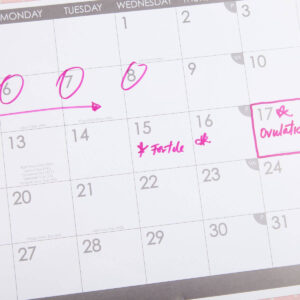There’s a certain amount of “I’ll-do-anything-ness” that comes with infertility – an interest in doing anything you can to increase your chances of getting pregnant without the struggle of lengthy, drawn-out procedures that may or may not be successful.
For example, I probably would’ve walked around on my hands for a week if someone had told me it was a sure-fire way to conceive. (FYI: This won’t work, so please don’t try it!)
In a search for medical alternatives that don’t involve invasive procedures and prescription drugs, many people, such as myself, have begun to lean heavily on Chinese healthcare practices, which have been in use for thousands of years.
Among the various treatment options available, acupuncture has become an exceedingly popular choice for a variety of different conditions.
One of which is infertility.
Here’s the thing, though: many people still question the validity of acupuncture for fertility. There are also significant misunderstandings about how Western doctors and Chinese healthcare practitioners use the practice and what it can do to enhance a woman’s reproductive system.
As you prepare for pregnancy, you might be left mulling over the who, what, when, where, and why of infertility acupuncture. Our community is here to help.
We’ve tracked down all the answers to your most pressing questions about whether those all-powerful needles have what it takes to improve your chances of getting pregnant.
Note: it’s INCREDIBLY important that you speak to your OB-GYN or healthcare team before beginning ANY acupuncture treatment.

This site contains affiliate links, meaning that we earn a small commission for purchases made through our site. We only recommend products we personally use, love, or have thoroughly vetted.
First Things First: What is Acupuncture?
Many of us have probably heard people discuss acupuncture or seen it performed on TV or in movies. Despite familiarity with the process, most individuals still don’t understand what the process is supposed to do and how it’s performed.
The Mayo Clinic describes acupuncture as:
“…a technique for balancing the flow of energy or life force — known as chi or qi (chee) — believed to flow through pathways (meridians) in your body. By inserting needles into specific points along these meridians, acupuncture practitioners believe that your energy flow will re-balance.”
Alternatively, Western healthcare practitioners view the process as a way to stimulate nerve endings, connective tissues, and muscles. This engages our bodies’ natural pain management and reparative systems.
Whether you follow the Eastern or Western view of acupuncture, practitioners perform the procedure the same way. A practitioner inserts tiny, thin needles into pressure points along your body, from the top of your head to your toes.
Once all of the needles are in place, they work together, along with the pressure points they’re each targeting, to help treat whatever conditions or situations are ailing you.
Does Infertility Acupuncture Work?
During my metaphorical jaunt down “Infertility Highway,” I found myself constantly pouring over internet articles searching for tried and true methods of improving my conception rates using the most natural ways possible.
Whether it was eating an “IVF pineapple” when I wanted to learn how to help implantation or perhaps starting to meditate during my quest to overcome stress and infertility–I was willing to do it all.
When a friend suggested I give acupuncture a try, I was open to the opportunity but still skeptical that it would work. I’d always thought of acupuncture as a pain management technique rather than an actual solution to medical problems.
Suffice it to say, I was surprised to learn that physicians have used acupuncture for fertility for centuries.
But here’s the catch: Acupuncture does not cure infertility itself. Instead, it can help treat the conditions that cause infertility. These include:
Acupuncture can also help treat the various side effects from the different fertility medications prescribed after a woman’s doctor has completed an infertility workup and begun various treatment protocols. These include symptoms such as nausea, headaches, and bloating.
Unfortunately, studies have shown that acupuncture is not usually a successful treatment option for tubal adhesions that can occur following pelvic inflammatory disease or, in some cases, endometriosis.

Acupuncture for Fertility Success Stories You Need to Hear
If you’re going back and forth about using acupuncture for fertility, success stories can sometimes help you decide.
Take me, for example; I had to use IVF to get pregnant with both of my daughters. Each time, during the month leading up to my embryo transfers, I went to acupuncture appointments one to two times a week.
While it’s hard to say definitively that these treatments did the trick; I got pregnant during the very first IVF cycle both times.
Want to hear more? Check out these other incredible successes!
Using Acupuncture to Conceive Twins
Another friend of mine struggled for years to get pregnant naturally. She was willing to go through various infertility treatments but was concerned about their minimal success rates.
She decided to try infertility acupuncture for a few months first and ended up pregnant with twins without any additional treatments.
Acupuncture After Miscarriage
One of the other women I had the opportunity to chat with about this article felt strongly that acupuncture was the tool she required to get pregnant finally.
When she and her husband first started trying to conceive, they got pregnant right away. Sadly, however, they lost that baby. Once they got the all-clear from her doctor to start trying again, they did. Almost a year went by with no more positive pregnancy tests.
A friend from work suggested she give acupuncture for fertility a try, so she did.
She also combined her acupuncture treatments with a regimen of Chinese herbs and cupping to manage her stress and assist her on her infertility journey.
Within two weeks of starting a routine of infertility acupuncture treatments, she was pregnant again. While she did end up miscarrying that pregnancy, she was able to conceive again only a month later and is now expecting a beautiful little boy.
If you search the internet for “acupuncture for infertility success stories,” you’re bound to find more stories like ours that can give you the positive boost you need to give the process a chance.
The Top Three Benefits of Using Acupuncture for Infertility
While it seems undeniable that acupuncture can play a role in treating infertility and helping couples conceive, the bigger question is, why? What can a series of needles do to improve a woman’s chance of getting pregnant?
Well, there are three significant ways that acupuncture points for fertility can prepare your body for conception.
1. Stress Reduction
Whether you’re dealing with situations like pressures from work or the grief of recurrent miscarriages, stress and infertility often go hand-in-hand.
Thankfully, if you’re looking for tips to conceive, acupuncture is a respected and validated option for stress management.
For folks who are struggling with chronic stress, or stress-related conditions, like anxiety or depression, studies have shown that their sympathetic and parasympathetic nervous systems are often unbalanced.
The studies conducted proved that individuals who took part in long-term acupuncture treatment routines saw increases in their parasympathetic functions and decreased sympathetic functions, thus returning balance to their nervous systems.
2. Increased Blood Flow
When it comes to embryo implantation, three different elements directly affect its success: endometrial thickness, morphology, and finally, uterine artery blood flow.
Scientists have also said that since endometrial thickness directly influences uterine blood flow, it’s one of the more significant reproductive characteristics we look at in terms of treating infertility.
Acupuncture has been said to “reduce uterine artery impedance,” or in layman’s terms, it allows more blood to pump to a woman’s uterus.
3. Balancing Endocrine & Hormone Systems
Ahh, hormones…one of the peskier elements of infertility testing.
While we all know female hormones have the power to send us running for chocolate and tissues (you know, for crying!) during that time of the month, they can also wreak havoc on our fertility.
Thankfully, acupuncture treatments can also help balance out a woman’s endocrine system, which can, in turn, correct infertility-causing hormonal imbalances.
Who Shouldn’t Treat Infertility with Acupuncture?
Generally speaking, acupuncture is safe for pretty much everyone.
People who typically need to avoid these infertility acupuncture treatments have issues such as bleeding disorders, like hemophilia; patients taking anticoagulants; or anyone with a metal allergy who could be allergic to the needles themselves.
If there’s a chance you could already be pregnant, it’s essential to be cautious and upfront with your practitioner before starting acupuncture treatment, as some points aren’t recommended throughout pregnancy.
Always make sure you consult with your doctor before pursuing acupuncture for fertility, and don’t hesitate to ask further questions if you choose to pursue acupuncture.
What to Expect During Acupuncture for Fertility?
I get it; getting ready to go in for your first acupuncture session can feel overwhelming. After all, you’re willingly heading to a doctor so they can insert needles all over your body!
Luckily, the process isn’t as scary as it might sound.
If you’re wondering what to expect during acupuncture for fertility, here’s a simple breakdown of how your session will go:
- During your first visit, expect to be at your healthcare provider’s office for 70 – 90 minutes.
- Your doctor will ask a series of general lifestyle and fertility-related questions that they’ll use to create a treatment plan for you.
- They may conduct a physical examination where they check your pulse and look at your tongue (Yes, you heard that right! The tongue is a highly important marker of health in Chinese medicine.)
- After this, they will begin inserting needles along your body. They may gently rotate the needles or apply electrical stimulation to the needles to enhance their performance.
- Once the needles are in place, you will lie still for 20 minutes to an hour while they work their magic. Afterward, your practitioner will remove the needles and throw them away.
Whenever I speak to people about my own acupuncture experience, one of the first things I always hear is: “Yeah, but does it hurt?”
My answer is a resounding “no!”
While you might feel a dull ache, pinch, or even a zapping sensation if the needle hits its point just right, you shouldn’t expect acupuncture to hurt.
Important note: Before you make an appointment with an acupuncturist, there’s two things you should keep in mind. First and foremost, make sure they’re a board-certificate practitioner. Second, make sure they actually perform infertility acupuncture…not all of them do!

What are the Most Common Acupuncture Points for Fertility?
Are you wondering where you can expect the needles to go during your infertility acupuncture treatments? Here’s a list of some of the most common acupuncture points for fertility:
- Yin Tang (the Third Eye): This point lies between a person’s eyebrows and is used for stress management and to encourage relaxation during treatments.
- Liver 3: The webbed area between your big toe and the one next to it is known for being a powerful acupuncture point for fertility. It helps with stress, blood flow, and other reproductive problems.
- Kidney 3 & Kidney 7: Located on the inside of your leg near several spleen points (see below), these points help boost the overall reproductive system.
- Spleen 6, 9, & 10: These points are very similar to the kidney points discussed above.
- Center Line: A channel located under a person’s belly button and near their pubic bones, these points help strengthen the overall condition of an individual’s uterus.
- Ren 17: One of the chest acupuncture points for fertility, Ren 17 is near a person’s sternum and is excellent for stress management.
How Often Do You Need Treatments & When Should You Start?
For myself and the other women I spoke to for this article, we all received the same instructions from our acupuncturists regarding how often patients should go for treatment: at least once a week.
While you certainly can go more often if you’re interested, you can still expect good results if you’re going on a weekly basis.
Now for the second part of the question – when should you start treatment?
Suppose you’re hoping to continue trying to get pregnant without assisted reproductive technologies, i.e., treatments like IUI or IVF. In that case, there’s no time like the present to set up your first appointment!
If you’d like to use acupuncture in conjunction with these procedures, many doctors recommend beginning treatment three months before the process starts.
Acupuncture for Fertility Cost – What Type of Financial Investment is this Process?
Depending on where you live, the cost of acupuncture for fertility can vary greatly.
On average, sessions cost between $75 and $300 each. Since the first session takes more time and is more involved, it usually ranges from around $120 – $300.
Be sure to check with your chosen acupuncture provider to find out whether they offer any type of package pricing.
One of the women I was lucky enough to talk with for this piece said that her acupuncturist had a budget-friendly treatment package that made affording her sessions much easier.

Overcoming Your Needle Fear
So, you’re interested in acupuncture but have a terrible fear of needles…does that mean the treatment isn’t right for you?
Try not to worry too much! While needle phobia is a very real thing, there’s still a chance that acupuncture could work for you.
To begin with, the “needles” used in acupuncture are nothing like the scary-looking syringes nurses and doctors bust out for your yearly booster shots.
They’re actually hair-thin. In fact, one normal medical needle is the equivalent of almost thirty acupuncture needles!
In an effort to help patients feel even more comfortable about the process, most of the acupuncture points for fertility used by many practitioners also include several calming points to promote relaxation throughout the treatment.
Are you still feeling nervous about giving infertility acupuncture a try?
You can always look into acupressure as an alternative. It uses many of the same points of the body without the needles!
Are You Ready to Give Infertility Acupuncture a Try?
When you’re on a quest to have a baby, the number of potential treatments and solutions available to you can be overwhelming. If you’re looking for a more natural option, acupuncture for fertility could be right for you.
Healthcare practitioners have utilized this treatment for centuries, and modern science has discovered validity in its results.
Whether you’re wanting to try another option before attempting IVF or you’re looking to enhance your treatment success rates, infertility acupuncture might be the way to go.
Have you ever tried acupuncture for fertility? If so, what was your experience like?









